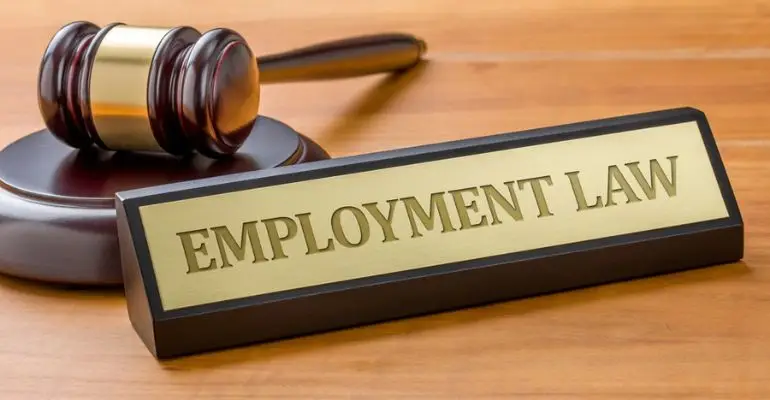What Can You Sue Your Employer For?

According to Federal and Florida employment laws, you have certain rights as an employee in the Sunshine State. Employee rights in Florida are enforced by government agencies tasked with protecting workers. However, when those protections fall short, you may be able to sue your employer.
What can you sue your employer for exactly? Several scenarios can serve as grounds for a lawsuit. However, whether you can sue in a specific situation depends on your employment circumstances and potential violations of your rights.
Hiring a Florida employment attorney can help you understand your rights and legal options. Take a closer look at how filing a claim against your employer works in the state.
What Can You Sue Your Employer For?
State and federal laws allow you to sue your employer for violating your rights. The following are the most common violations of employee rights.
Discrimination
Discrimination in the workplace occurs when an employer makes decisions about an employee — or potential employee — based on that employee being a member of a protected class. The types of decisions that employers cannot make based on an employee being a member of a protected class involve:
- Hiring
- Firing
- Assigning promotions
- Assigning positions
- Assigning raises
- Delegating work duties
- Granting benefits
- Determining location assignments
Both federal and state laws protect against workplace discrimination and define specific classes as being protected.
While the laws mostly overlap, Florida does protect against some classes that are not protected at the federal level and vice versa. Protected classes in Florida include:
- Gender
- Gender identity
- Sexual orientation
- Race or ethnicity
- Citizenship status
- Color
- National origin
- Religious beliefs
- Disability
- AIDS or HIV status
- Sickle cell status
- Genetic information
- Marital status
- Pregnancy
- Age
Most of these classes are protected by Title VII of the Civil Rights Act of 1964. The remaining classes are protected by the Florida Civil Rights Act of 1992.
Harassment
State and federal laws also protect against workplace harassment. Workplace harassment occurs when you are subjected to unwelcome conduct based on your membership in a protected class, creating a hostile work environment.
One of the most common examples of this is sexual harassment at work, which occurs whenever another party makes inappropriate sexual comments or inappropriately touches you without your permission.
Quid pro quo is a type of sexual harassment, which means that someone in a position of authority offers benefits in exchange for sexual favors or demands sexual activity to avoid suffering retaliation. Whether you are being bribed or facing extortion, this behavior is inappropriate.
Another type of sexual harassment is one where another party creates a hostile environment, which may involve uncomfortable jokes or pervasive innuendo. The more frequent and blatant the activity, the more likely a court will rule that it is harassment. Keep in mind that such activity counts as harassment even when it is not sexual, as long as it occurs because you are a member of some other protected class.
If you are being harassed, it is best to notify human resources or your superior — if they are not the harassing party — immediately. You should also make clear to the harasser that the behavior is unwelcome and that they should stop, documenting the interaction if possible.
Wrongful Termination
Florida is an at-will employment state, which means that your employer can fire you for almost any reason or no reason at all. However, there are still reasons employers cannot legally fire you.
For example, it is illegal to fire someone because they are a member of a protected class. Additionally, you cannot fire someone as retaliation for taking advantage of their rights.
You may also have the right to file a wrongful termination lawsuit if your employer fires you in violation of your employer contract. Many workplaces, especially unionized ones, have specific in-house rules about when someone can be fired and what types of warnings they need to be given before being fired.
These rules become a contract between the employer and the employee. Wrongful termination lawsuits can be filed when an employer violates a contract.
If you believe you were wrongfully terminated, contact a workplace rights lawyer immediately. They can help you understand your rights and determine whether you have an actionable case. Wrongfully terminated employees may not get the results they need if they do not speak to an attorney immediately.
Wage and Hour Violations
The basic tenets of wage law are relatively simple. If you perform the work you agreed to, you should get paid within a reasonable amount of time. The definition of a reasonable amount of time depends on your workplace, but it usually means once a week, every other week, or once a month.
Your employer has no right to pay you less than you earned. While they may have the right to dock your pay in some circumstances, there are restrictions on that behavior and penalties when employers do so improperly. Furthermore, an employer can never dock your pay below minimum wage.
Other types of wage violations involve federal law. If you are a non-salaried worker and work more than 40 hours a week, your employer is legally required to pay you 50% more than your usual hourly rate for every hour beyond 40 hours. If you are not paid overtime, your employee is violating your rights. It is also a violation of your rights if they pay the extra hours in a later week to avoid paying overtime.
Another key rule is that you cannot legally be paid less than the current state minimum wage and cannot be paid “under the table.” The latter means it is illegal for your employer to pay you without declaring that pay to the IRS and paying appropriate taxes.
If you think your employer is violating wage and hour laws in Florida, document those violations. Carefully track your hours worked and your pay stubs. Disparities could prove that your employer is violating your rights.
Retaliation
Retaliation in the workplace occurs when your employer makes decisions based on whether you have taken legally protected actions. These are often the same types of decisions that would indicate discrimination in the workplace. However, the reasons for these actions differ.
In retaliation cases, workers will have typically performed one of the following actions:
- Reported workplace discrimination or harassment
- Reported illegal activities in their workplace
- Cooperated with investigations into such complaints and activities
- Legally took time off due to the Family Medical Leave Act
- Requested accommodations per the ADA
- Requested religious accommodations
- Discussed wages with other employees
These activities are legally protected, so you should not face repercussions for engaging in them. If your employer does punish you for them, you can file a lawsuit against them.
Instances When You Cannot Sue Your Employer
At-will employment means your employer can fire or demote you for many reasons. Your employer could, for example, legally fire you because you do not own a car. Car ownership is not a protected class, so this would not be considered discrimination.
If you do not like an action your employer has taken and do not have the right to file a lawsuit, you may still have options. Most employers have internal resolution procedures that may be able to resolve your problem. Communicate with HR and explain your concerns. They may be able to help you.
Your Workplace Rights in Florida
Federal and state laws give you many rights in the workplace. In addition to rights protecting you from discrimination and harassment, you can work in a safe environment, which means that your workplace needs to ensure that there are no dangerous conditions like stairs with railings or a parking lot without lights.
If you are concerned that your workplace may not be safe, you can check workplace regulations via the Department of Labor or the Occupational Safety and Health Administration.
Steps to Protect Your Employee Rights
If you believe your employee rights have been violated, you should take the following steps as soon as possible.
Document Everything
Gather as much documentation as you possibly can. For pay disputes, this might mean you need receipts. If you are being harassed, you should keep copies of offending emails, voicemails, or text messages. When documenting conversations, be aware that it is illegal in Florida to record a conversation without all parties’ approval.
Report Issues Internally
If there is an internal method for reporting issues, take advantage of it. However, this may not resolve the problem, especially if the person in charge of the process is involved in the situation. When reporting internally, document your attempts to do so and any response you receive from your employer.
File a Complaint
If the internal process is not working, you may want to file a complaint with the Equal Employment Opportunity Commission (EEOC) or the Florida Commission on Human Relations (FCHR). These government organizations have the authority to investigate employee rights violations and take action against the offending employers.
After filing a complaint, you should be safe from retaliation, which is one of the actions protected by law. However, some employers will retaliate anyway. If you are concerned about retaliation, consult an experienced employment law attorney.
Consult an Attorney
The best way to determine what you should do in the face of workplace discrimination or other violations is to discuss your case with a seasoned employment law attorney at Wenzel Fenton Cabassa, P.A.
We can explain your rights and help you remain anonymous throughout as much of the process as possible. We understand that filing a complaint or a lawsuit can be stressful and intimidating. That is why we aim to protect and support you every step of the way.
The Importance of Hiring a Florida Employment Law Attorney
Choosing to file a lawsuit or a complaint against an employer is a big step. If you take action when you should not, it may end your employment and have unpleasant results.
Our attorneys can determine your legal options and guide you through the process so that you do not make mistakes. Contact us online or by phone to speak to a lawyer right away.
A Lawsuit Can Protect Your Rights
State and federal laws protect workers from discrimination, harassment, wage violations, retaliation, and wrongful termination. If any of these rights are violated in Florida, workers can retain a lawyer and file a lawsuit against their workplace.
Do not delay if you are facing unfair treatment at work in Florida. You need a skilled advocate fighting for your future. Contact Wenzel Fenton Cabassa, P.A. by phone or online for a free, confidential case evaluation with an experienced employment law attorney today.
Please Note: At the time this article was written, the information contained within it was current based on the prevailing law at the time. Laws and precedents are subject to change, so this information may not be up to date. Always speak with a law firm regarding any legal situation to get the most current information available.
Related Posts
Recent Posts
- False Claims Act Retaliation & Your Rights
- Fired for Being Pregnant? 5 Situations When You Should Call an Employment Lawyer
- Can My Boss Take My Tips? The Laws of Tip Ownership
- What Does “Meets FCRA Requirements” Mean?
- Can Your Employer Contact You While on Medical Leave? Know Your FMLA Rights in Florida
Contact Us

FREE HELP GUIDES
Dealing with unpaid wages, discrimination or wrongful termination? Get the information you need to protect your workplace rights. We offer employment law resources to help you fight for workplace justice.




